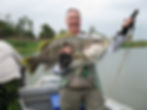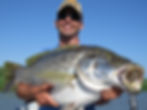Papuan Black Bass - The Guardian Of Hell

Mention "black bass" and you will likely get the attention of most anglers. Also known as the largemouth bass, this fish created a multi-million dollar tackle industry and paved the way for the development of freshwater recreational angling in the past few decades. It is the undisputed favorite tournament fish in the USA and Japan. Unknown to many, on a remote island on the other side of the planet, lies a lesser known namesake, with a totally different appeal.
Papua New Guinea is located in the South Pacific, and occupies the eastern half of the island of New Guinea and its offshore islands, a region of the south-western Pacific Ocean north of Australia.
Its capital, located along its south-eastern coast, is Port Moresby. The western half of New Guinea forms the Indonesian provinces of Papua and West Papua.
Papua New Guinea is one of the most culturally diverse countries in the world. 848 different languages are listed, of which 12 have no known living speakers. Most of the population of over 7 million people live in customary communities, which are as diverse as the languages. It is also one of the most rural, as only 18 percent of its people live in urban centers. The country is one of the world's least explored, culturally and geographically. This island also possesses one of the wildest river systems in the world, and is home to the legendary Papuan Black Bass (Lutjanus goldiei) - pound for pound the hardest fighting freshwater fish in the world.
Until recent years, few have had the chance to see a Papuan Black Bass, let alone catch one. While it is a hardy fish capable of surviving in harsh conditions, its availability has been largely restricted to a few areas in Borneo, parts of Indonesia, and of course, the island of New guinea. Due to the uncontrolled exploitation of its natural habitat, the population of Papuan Black bass has been decimated in many areas, with the exception of Papua New Guinea. Thanks to the conservational practices by Sport Fishing PNG, the local villagers have made good efforts in maintaining the population of Papuan Black Bass, with much success. The well-established charter service of SFPNG and her experienced guides have also provided anglers a chance to venture into exotic locations to meet this hoodlum of the river.
The Papuan Black Bass shares the river with several other popular species, including Saratoga, striated snakehead, and most notably, the Barramundi - a highly prized sport fish in Australia. Contrary to popular belief, you are more likely to encounter a big wild barramundi in PNG than in Australia, possibly due to the pristine river conditions and abundance of food available. In recent years, we had many bookings from Australian clients hoping to catch their first Barramundi over a meter in length.

If the Barramundi is the chivalrous knight in shining armor, then the Papuan Black Bass must be the guardian of hell. It may be in the same Lutjanus family as the more popular Fingermark snapper and Mangrove jack, but something about the Papuan Black Bass gives it a barbaric demeanor. Cloaked in a dark suit of rust coloured scales, it has a pair of big, vicious looking eyes and a strong jaw lined with razor sharp teeth. A contrasting light yellow dorsal fin looking like a blonde Mohawk hairstyle completes its thuggish image.
Just as the guardian of hell rule the underworld, the Papuan Black Bass tyrannize the deeper parts of the river, especially in places where you find rock bars, fallen timber, heavy weeds and sunken structure. These places offer excellent cover for the Black Bass to spring an ambush attack. Fast flowing water constantly shapes the rivers of PNG and the transient riverscape fuels the opportunistic character of the Bass. The gushing waters acts as a double edge sword, quickly eroding its hideout, yet bringing with it rich sources of food. The fast flowing water offers no second chance, forcing the Black Bass to kill its prey with a single fatal blow.
Fishing for the Papuan Black Bass involves serious planning and preparation on the part of the guides. While the Black Bass may be in healthy numbers in the rivers, certain rivers may be inaccessible for various reasons at different times of the year. As such, it takes plenty of local knowledge to ensure fishing can be done in a safe and productive way.
Like the way a barramundi gracefully leaps out of the water with its shiny scales shimmering in the setting sun? You are not getting any with the bass. Black Bass fishing calls for close quarters combat employing guerilla tactics. The strike of a black bass is decisive but unpredictable, often happening at times when you least expect it.
Many of our clients come to PNG hoping to land a trophy bass but have returned home feeling defeated. To have a chance to land a nice bass, you will need to treat it with respect, and the most basic form of respect is using high quality tackle. Treble hooks and split rings, being your first line of defense, must be capable of withstanding the deadly blow of the bass. We have seen clients' hooks and rings mangled beyond our wildest imagination. I stick to Mustad 5x strong 9430DS trebles and forged stainless steel split rings. They offer outstanding quality at very reasonable prices, and are excellent for upgrading stock hooks and rings.



Retrofitting favorite lures like Halco Scorptions, Classic Barras and Salmos with upgraded hooks and rings will increase the chances of success. We recommend deep diving lures to get into the strike zone, but they should be buoyant enough to avoid getting snagged. The rip and pause method of working the lures is most effective in getting reaction strikes.
In some rivers where snags are a big problem, we have started using weedless soft plastics. I had much success with the new Mustad 38117NPBN Ultrapoint Mega Bite worm hook that can take up to 6 inch soft plastics. Remember, the Black Bass is not going to waste energy lunging at a tiny lure, use big lures to catch its attention.
I suggest you put away your favorite 20lb barra outfit as black bass fishing is a totally different game. If you fail to turn its head in the first 5 seconds of engagement, you have given the game away. Some clients land bass on lighter gear as they are highly experienced and have been fishing with us through the years, but if you are seriously after big fish, use nothing less than 50lb tackle. We recommend that you bring an 80lb outfit as well.

""As the guide brought the engine to a halt, your senses heighten. Seeing the fast flowing stream littered with debris, you realize you have reached black bass country. Pieces of timber spiraled on the surface, informing you about the presence of eddies. You shudder at the thought that there is actually a fish strong enough to withstand such harsh conditions. Moments later, your lure hits the water, marking the start of an imminent battle, one that would stretch your physical and mental limits. Your first attempt to intrude was a half-hearted one. The guide directed you to cast towards a prominent snag in a corner of the river. After a few unsuccessful attempts, you finally hit the target. The result was astounding. Without warning, a violent strike almost ripped the rod from your hands. Line started peeling from your reel as though it was in free spool. Within seconds, it was over. Your lure lost forever, in an underwater dungeon made out of sunken logs and weeds. In the aftermath of the lost battle, a deadly silence enveloped the boat. You were badly shaken, still unsure of what you could have done better. The guide smiles and help you rig up your tackle again. In the next hour, you experience several times, this agonizing feeling of getting hit and snagged. With the abundance of strikes making up for lost opportunities, losing a good fish in a highly unfair setting made you frustrated. You knew you had to give 100% of your concentration and get everything right in order to stand a chance against this dirty player. On the next hit, you took full advantage of your body weight by leaning backwards, raising your rod as instructed. The rod bowed over into an uncompromising bend. In a single breath, you successfully wrestled the fish away from its lair. For the first time, you were fighting on neutral ground. Even so, horror stories of jammed reels, snapped lines and broken rods flood your thoughts. You hang on desperately as your opponent circles under the boat, threatening to reach the nearest structure where it could seek refuge. You could feel the lactic acid building up in your arms with every turn of the handle. Finally, the beast relents and a black shadow starts to surface. The Black Bass fought all the way to the end, with its short and powerful bursts. You take a breath of relief when the fish was finally lifted on board. Even then, the uncompromising snarls of the black bass and its lure crunching tactics did not stop. As the guide safely unleashed the beast from its shackles, your adrenaline rush is still far from over. With shaking hands, you try in vain to hold the beast up for a photo, but your tired arms could hardly bear its weight and you end up hugging the beast instead. There was no boisterous revelry with the conquest of a trophy fish. Your mates look at you with envy and give you a quick nod of approval, all while their hands firmly gripping their rods, knowing that they could be next in line to get punished by the guardian of hell. As the guide lowered your dream catch gently back into the water, another rod bends over and your mate lets out a painful grunt. Your hand was reaching out for a beer in the esky, but you withdraw. You know the reward of catching another black bass outweighs the comfort of an ice cold beer. The beer can wait. You choose to get punished again..."
Article excerpt from Mustad Asia & Australia
Jia An Ng - sales@sportfishingpng.net
Sport Fishing PNG Sales Manager and Mustad Field Tester























